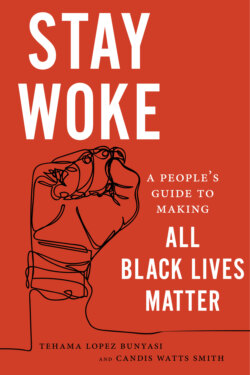Читать книгу Stay Woke - Candis Watts Smith - Страница 16
На сайте Литреса книга снята с продажи.
Health
ОглавлениеBasic indicators of quality of life measure how healthy people feel and how long they are expected to live. According to epidemiological research, Black people live shorter lives than whites do. Also shocking is the fact that the Black-white mortality gap did not close for the forty years between 1960 and 2000. Researchers project that if this gap had closed, nearly eighty-four thousand Black deaths per year could have been prevented.63 Obviously, how healthy a person is has a lot to do with individual behavior (e.g., eating well, exercise), but there is so much more to it than that. To begin, “public health research increasingly recognizes that racial/ethnic disparities in health are rooted in social factors such as SES [socioeconomic status], discrimination, and residential segregation,”64 things we have already discussed.
Again, where you live can have a tremendous influence on your life. Blacks are highly segregated, and Latinxs increasingly so, and thus are isolated from “high-opportunity neighborhoods,” or neighborhoods marked by “sustainable employment, high-performing schools, healthy environments, access to high-quality health care, adequate transportation, high-quality child care, neighborhood safety, and institutions that facilitate civic engagement.”65 To a large extent, Blacks are excluded from the geography of opportunity, and their health outcomes are dampened as a consequence. Food deserts, or places where high-quality, affordable food is not easily accessible, are likely to form in low-income and Black neighborhoods.66 When hospitals close, they are more likely to do so in low-income and Black neighborhoods.67 When family-planning clinics are eliminated by state policies, Black and Latina women are the most negatively affected, as their access to reproductive health care services is substantially decreased.68 If you thought we were being merely metaphorical by talking about the “geography of opportunity,” guess again. Your zip code, as structural inequality would have it, is a helpful predictor of your life expectancy, such that five miles can make a twenty-year difference.69 That’s right, your zip code is a better predictor of your health than your genetic code is.
One thing that stands out to us is that even when Black people attain more education, there is not necessarily an increase in well-being (recall, for example, that even with more education, Blacks still fall behind in levels of wealth, and they pay even more for their homes). In the case of infant outcomes, research shows not only that Black babies are two to three times more likely to die than are white babies in their first year of life but also that even as Black women step into the middle class, infant-mortality rates do not decline. In fact, there is a larger disparity between Black and white women at the higher end of the socioeconomic spectrum than at the lower end. One emerging theory is that middle-class Black women have to contend with chronic stress, including stress that results from exposure to racial discrimination.70 Black lives are literally more likely to be lost.
As mentioned, all of these domains of life we’ve discussed so far are interrelated. “Educational attainment and income provide psychosocial and material resources that protect against exposure to health risks in early and adult life”; meanwhile, “persons with low levels of education and income generally experience increased rates of mortality, morbidity, and risk-taking behaviors and decreased access to and quality of health care.”71 As we know, Blacks are less likely to have access to quality education and are shut out of job opportunities more so than whites. Keeping that in mind, it’s important to note, “unemployed persons tend to have higher annual illness rates, lack health insurance and access to health care, and have an increased risk for death. Several studies indicate that employment status influences a person’s health; however, poor health also affects a person’s ability to obtain and retain employment.”72 Rinse. Repeat. The cycle continues.
—
